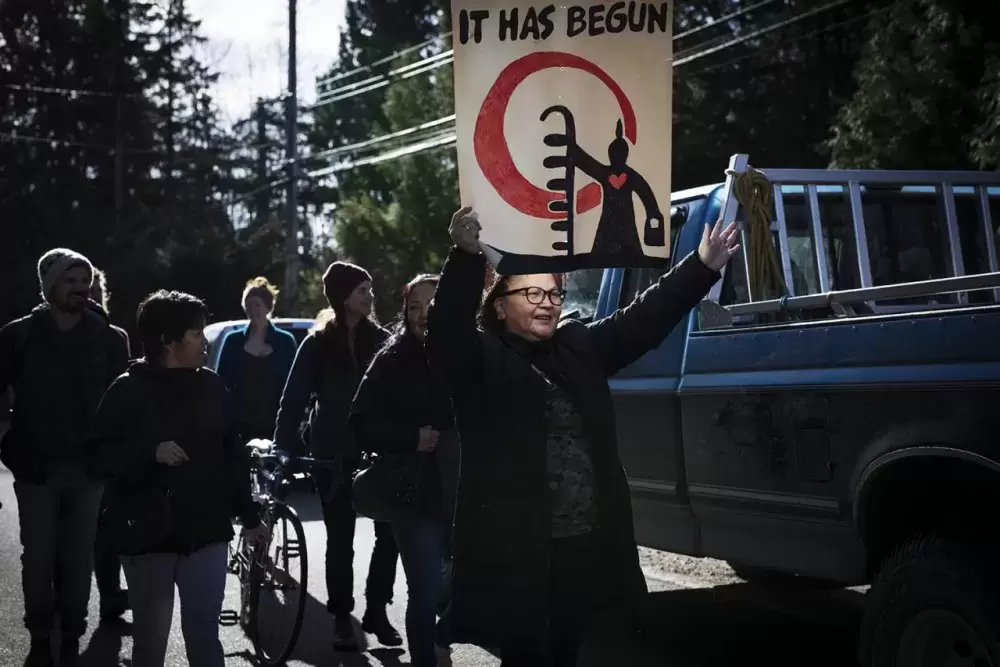A group of protestors blocking access to a gas line construction site in Wet’suwet’en traditional territory are being forcibly removed from their encampment by RCMP, sparking nation-wide demonstrations in support of Indigenous rights and climate action. The Wet’suwet’en hereditary chiefs are fighting to stop construction of the Coastal GasLink pipeline project in northwest B.C.
On Feb. 12 the Wet’suwet’en House announced that they have launched a legal challenge, asking the Federal Court to declare that Canada has a constitutional duty to keep the country’s greenhouse gas emissions well within the Paris Agreement limits.
“The climate crisis is already hitting our House territories hard. You only have look at the shrinking Hudson Bay mountain glacier and count the salmon,” they stated.
“If Canada is allowed to continue approving infrastructure for fracked gas projects on a 40-year timeline, our territories will become a wasteland before the project licenses expire,” said Dine Ze’Lho’imggin (Alphonse Gagnon).
Coastal Gas Link, selected by LNG Canada in 2012, is building a $6.6 billion pipeline that will run 670 kilometres across northern B.C. to carry natural gas from an area near Dawson Creek, B.C. to Kitimat on the west coast. From the Kitimat facility, the LNG will be exported to markets overseas.
Both LNG Canada and Coastal GasLink say they have agreements in place with 23 impacted nations in northern B.C., but the Wet’suwet’en say their elected council are not the final authority when it comes to these types of developments in their traditional territories.
A group supporting Wet’suwet’en hereditary chiefs set up an encampment along the route of the proposed pipeline project, near Houston, B.C. within Wet’suwet’en territory. In December 2018 Coastal GasLink was granted a court injunction against the protestors.
In January 2019 armed members of the RCMP moved in to enforce the injunction and arrested Wet’suwet’en supporters. Another blockade was set up further down the road while rallies sprang up across Canada and parts of the US showing solidarity with the hereditary chiefs.
In December another BC Supreme Court injunction was granted against the Wet’suwet’en blockade. On Jan. 5, 2020 talks between Wet’suwet’en hereditary chiefs and the provincial government failed. The following day Coastal GasLink announced it would start work on the pipeline. Wet’suwet’en hereditary chiefs responded by sending out a nation-wide call for solidarity protests.
Then in early February RCMP began making arrests at the Wet’suwet’en blockade.
The Wet’suwet’en hereditary chiefs argue that the elected chief and council is a construct of Canada’s Indian Act, and while they may have given approval, the hereditary chiefs of the five clans have not.
“The Nuu-chah-nulth have been watching with dismay as the RCMP enter onto Wet’suwet’en lands and arrest and forcibly remove heads of their government, matriarchs and community members who are peacefully defending their lands, which is within their laws,” said NTC President Judith Sayers in a written statement.
Very quickly blockades across Canada sprang up as people from all walks of life stood in solidarity with the Wet’suwet’en chiefs. On Jan. 23 a group of demonstrators occupied the lobby of the Ministry of Energy, Mines and Petroleum Resources in Victoria, B.C. resulting in arrests.
Within days roadblocks went up around Vancouver Island ferry terminals, at two key bridges in Victoria and on the highway near Courtenay, B.C. Demonstrators set up an encampment at the front entrance to the B.C. legislature, disrupting the Feb. 11 Throne Speech. On Feb. 12 the demonstrators dismantled the encampment.
In Vancouver dozens of arrests were made as demonstrators blocked access to the Port of Vancouver and a Cambie Street intersection.
In Ontario and Quebec, CPR rail lines came to a halt as demonstrators set up on the tracks. The Reconciliation Bridge in Calgary, Alberta was also closed due to a blockade.
Indigenous leaders from BC and from Wet’suwet’en spoke on the stairs of the legislature, pointing out that what is happening in Wet’suwet’en territory goes against Bill 41, UNDRIP.
“Reconciliation cannot be achieved at gunpoint,” said Ron George, referring to the armed arrests made in Houston, BC.
“Indigenous people across the country are saying that reconciliation is dead,” said NTC President Sayers. “The RCMP, the government of British Columbia, the government of Canada, have been pushing the reconciliation agenda and stating that they want to reconcile for past wrongs but where is the Prime Minister? Where is the Premier? How are they fighting for reconciliation? For UNDRIP? Instead, Indigenous peoples continue to be forcibly removed from their territories and jobs and revenue continue to take precedence over first nations consent over their territories.”
“The government is fueled by corporations, not reconciliation; we stand with the Wet’suwet’en in protecting their lands, waters and resources from development of gas pipelines,” Sayers stated.







